Quick Summary:
.NET Core Libraries offer various tools for .NET developers, spanning from resilient policies with Polly, rate limiting using AspNetCoreRateLimit, and health checks via HealthChecks, to Security and authentication with IdentityServer and ASP.NET Core Identity, enhancing development efficiency and application reliability.
The .NET Core ecosystem highlights modern software development’s flexibility and strength. It includes various libraries, each with unique tools, empowering developers to create robust and secure applications. From the intricate nuances of managing authentication and Security using IdentityServer and ASP.NET Core Identity to the resilience-enhancing capabilities of Polly, these libraries serve as invaluable assets for developers, enriching the development experience.
But this guide aims to do more than just introduce you to these .NET Core Libraries. Our primary goal is to provide you with the knowledge, insights, and practical skills necessary for effectively utilizing these ASP NET Core Libraries. With this expertise at your disposal, you will be well-equipped to design applications meet & exceed expectations in terms of reliability, performance, and Security.
Top .NET Core Libraries
ASP.NET Core has a thriving ecosystem of open-source libraries that augment the framework’s capabilities and accelerate development. This section explores some of the most useful .NET Core Libraries across categories like web frameworks, ORM, Security, APIs, testing, logging, and background jobs, adhering to .NET Core best practices to ensure efficient and robust development.
Let’s begin with the Database ORM!
.NET Core Libraries For Data Access & ORM
Entity Framework Core offers modern ORM capabilities, Dapper provides a lightweight micro-ORM approach, NHibernate is a mature feature-rich ORM, while ADO.NET with native database providers represents direct data access with optimal control and performance for scenarios where ORM may not be suitable.
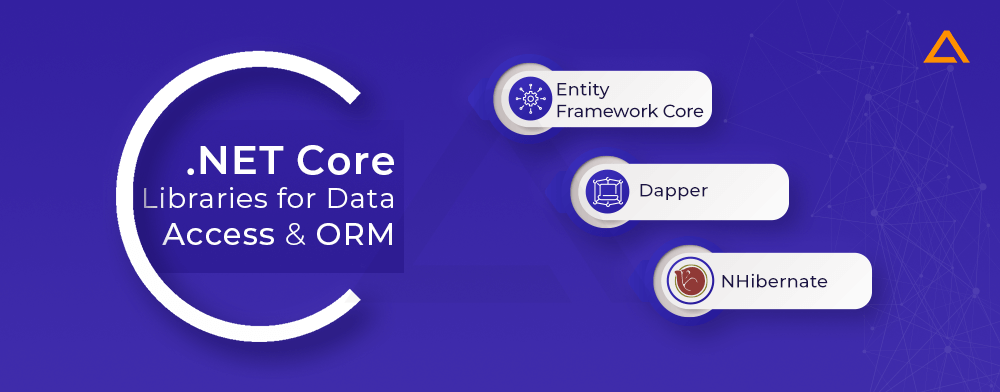
Entity Framework Core – Object-Relational Mapper For .NET
GitHub Star: 12.8K | Fork: 3K | License: MIT License
Entity Framework Core is a popular object-relational mapper that allows .NET developers to work with a databases using .NET objects and LINQ. It eliminates the need for most of the data access code and database plumbing that developers usually need to write. It offers a level of abstraction for relational databases, facilitating the utilization of LINQ and Lambda expressions for data querying, storage, and retrieval. Additionally, it manages the translation between entities and database tables, oversees change tracking, enables both eager and lazy loading of related data, handles concurrency conflicts and transactions, supports caching, provides migration capabilities for altering database schemas, and extends compatibility to databases like SQL Server, SQLite, MySQL, PostgreSQL, and others.
Key Features of Entity Framework Core includes:
- ORM Efficiency
- LINQ Integration
- Streamlined Data Access
- Database Abstraction
- Schema Migration
- Concurrency Management
- Caching Mechanisms
Dapper – Micro ORM for Mapping SQL Results to .NET Objects
GitHub Star: 16.5K | Fork: 3.6K | License: Apache 2.0
Dapper is a simple micro ORM that provides a thin wrapper over ADO.NET enabling you to map SQL query results to .NET objects. It eliminates the need to write a lot of repetitive SQL code and plumbing for results mapping. Dapper allows you to define the shape of result sets using anonymous types or concrete classes. It handles materializing result sets into objects, handling parameters, mappings to list/dict/dynamic etc. Dapper supports advanced mappings, stored procedures, multi-mapping, transactions, type handlers and more. It provides high performance and flexibility making it suitable for simple usage in microservices where you want precise control without the overhead of full ORM.
Key Features of Dapper
- Lightweight & fast performing mapper
- Maps SQL query results to .NET objects
- Handles materialization of lists, dicts, dynamics etc.
- Supports anonymous types or concrete classes
- Integrates with ADO.NET IDbConnection
- Extensible type handlers
- Structural conventions and Inference
- BMP for CRUD operations
- Portable library supporting .NET Standard
NHibernate – Mature ORM with SQL and LINQ Support
GitHub Star: 2.1K | Fork: 920 | License: LGPL-2.1 license
NHibernate is a mature and feature-rich object-relational mapper for .NET with a long history of production deployments. It provides an automated mechanism to map between .NET domain model objects and a traditional relational database. NHibernate supports mapping via XML or attributes, performs transparent persistence of changes via configured session management, provides querying capabilities via SQL, LINQ, criteria API, and supports advanced ORM features like caching, eager/lazy loading, cascading, inheritance mapping, concurrency control, compositional querying and more. NHibernate works with SQL Server, MySQL, SQLite, PostgreSQL databases.
Key Features of NHibernate
- ORM Framework
- Mapping
- Session Factory
- Lazy Loading
- Caching
- Query Language (HQL, Criteria, LINQ)
- Transactions
- Inheritance Mapping
- Concurrency Control
- Active Record Pattern
Also Read: .NET vs JAVA in 2023, which one to choose?
ASP NET Core Libraries For Web Frameworks
For building web applications and APIs in .NET, widely used options include ASP.NET Core MVC for robust MVC-pattern web apps, ASP.NET Web API for HTTP services, Blazer for interactive client-side web UIs using C#, Razor Pages for page-focused coding model, XAF for business apps, and bridges to NodeJS/Python.
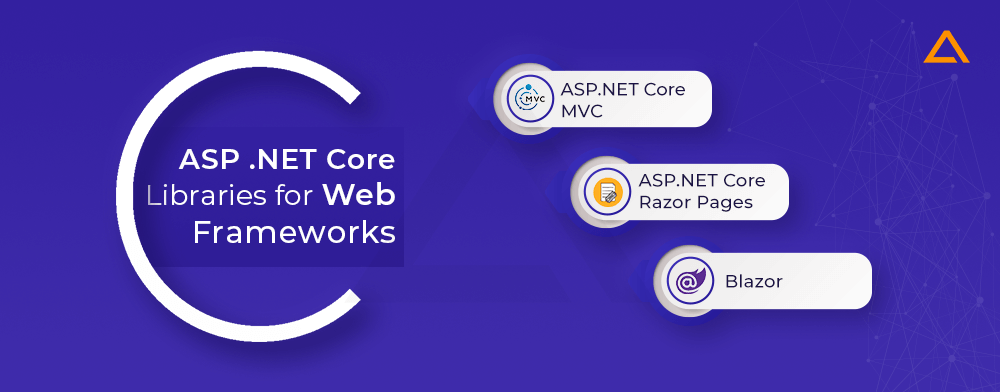
ASP.NET Core MVC – Model View Controller Framework
GitHub Star: 32.7K | Fork: 9.4K | License: MIT license
ASP.NET Core MVC is a popular open-source web framework for building modern web APIs and web applications using the Model-View-Controller architectural pattern. It provides capabilities for routing HTTP requests to controllers, binding user input from requests to action method parameters, validating input using data annotations, injecting dependencies into controllers, returning responses using view templates built with Razor syntax, and integrated well with client-side JavaScript frameworks like Angular, React and Vue via JavaScript services. ASP.NET Core MVC has a modular architecture that is highly testable and extensible to plug in additional capabilities like logging, caching, authentication etc.
Key Features of ASP.NET Core MVC
- Dependency Injection (DI)
- Testability
- Attribute routing
- Global filters
- Anti-forgery tokens
- Web API integration
- Authentication and authorization
- Entity Framework integration
- Bootstrap and front-end frameworks
- Cross-Origin Resource Sharing (CORS)
- Razor view engine
- Separation of Concerns
- Model-View-Controller architecture
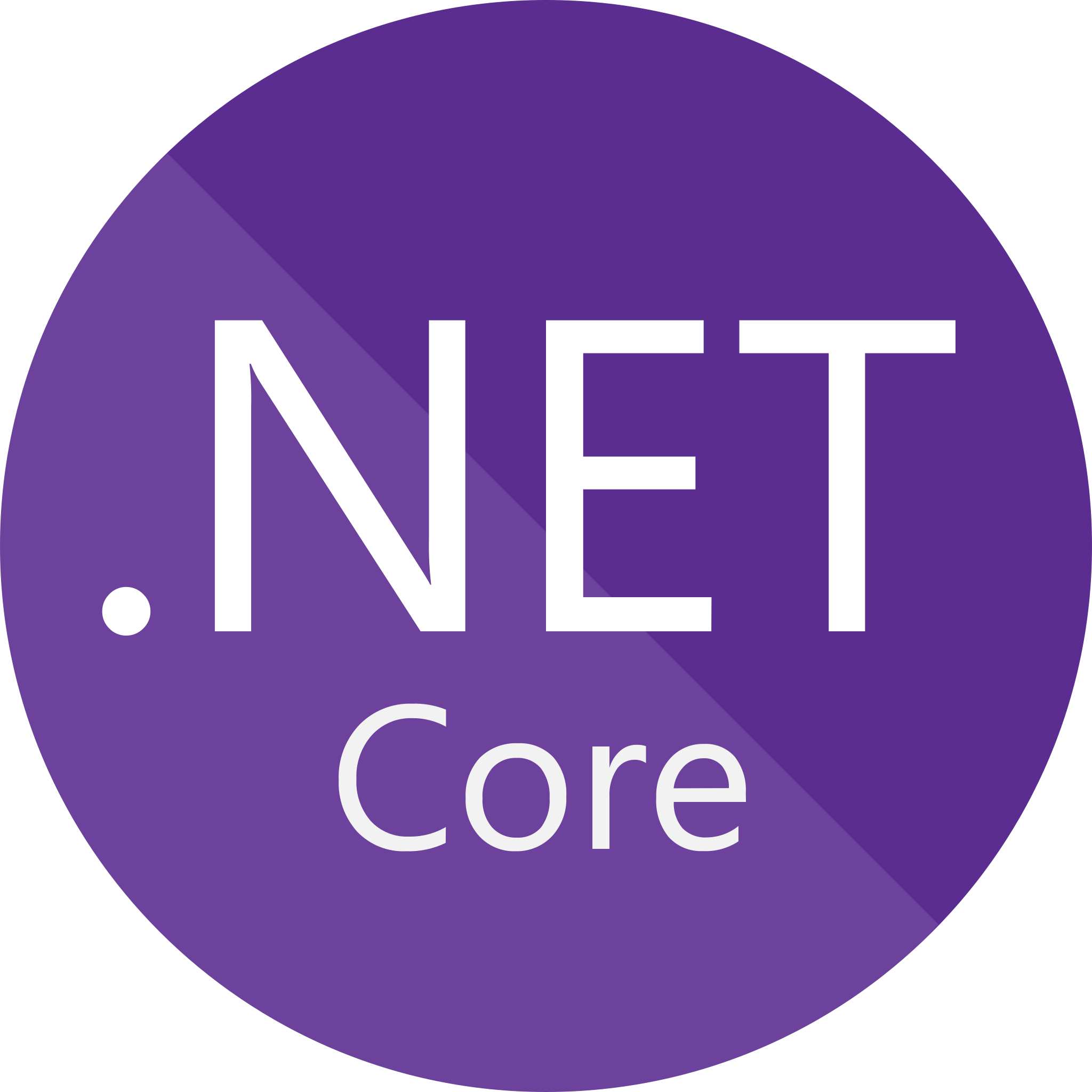
Hey!✋
Are you looking to hire .NET Developers?
Unleash the boundless potential of your .NET projects with our elite team of expert .NET developers @ Aglowid.
ASP.NET Core Razor Pages – Page Focused Framework Model
GitHub Star: 416 | Fork: 172 | License: MIT license
ASP.NET Core Razor Pages is a page-focused approach for coding web apps without the need for controllers and actions. It uses Razor for embedding server-side code in CSHTML pages. Key capabilities include organization of pages using the Pages folder structure, handling page requests through handler methods, model binding, filters, areas, dependency injection, layouts with shared UI elements, supporting common patterns like CRUD operations, built-in tag helpers, and easy integration with client-side frameworks. Overall, Razor Pages provides a productive alternative to the MVC pattern.
Key Features of Razor Pages
- Page-based framework
- Model Binding
- Page Events
- Razor Syntax
- Route Templates
- Razor Pages folders
- CRUD operations
- Razor Pages conventions
- Web API integration
- Anti-forgery tokens
- Razor Pages Filters
- Cross-Origin Resource Sharing (CORS)
Blazor – UI Framework Using C# and HTML
GitHub Star: 9.3K | Fork: 668 | License: Apache-2.0 license
Blazor is a web UI framework from Microsoft that enables building interactive client-side web apps using C# and HTML. Blazor uses WebAssembly to run .NET code in the browser alongside JavaScript. Key features include Razor components model, event handling, routing, layouts, dependency injection, and JavaScript interoperability. Blazor supports various hosting models including client-side WebAssembly, server-side, and hybrid. By enabling full-stack .NET development, Blazor simplifies building modern web apps with .NET on both client and server.
Key Features of Blazor
- Component-based UI Framework
- Razor Syntax for components
- Blazor Server SignalR integration
- Progressive Web App (PWA) support
- Blazor WebAssembly for client-side apps
- Razor Components for server-side apps
- .NET integration with shared code
- Cross-platform capabilities
- Blazor Server for real-time apps
- Blazor WebAssembly for offline-capable apps
.NET Core Libraries For Security
Security libraries provide tools & APIs to enhance software security. These libraries offer features such as authentication, authorization, encryption, and vulnerability detection. Common example includes OWASP libraries for web application security and libraries like Bouncy Castle for cryptographic operations, helping developers safeguard their applications and data.
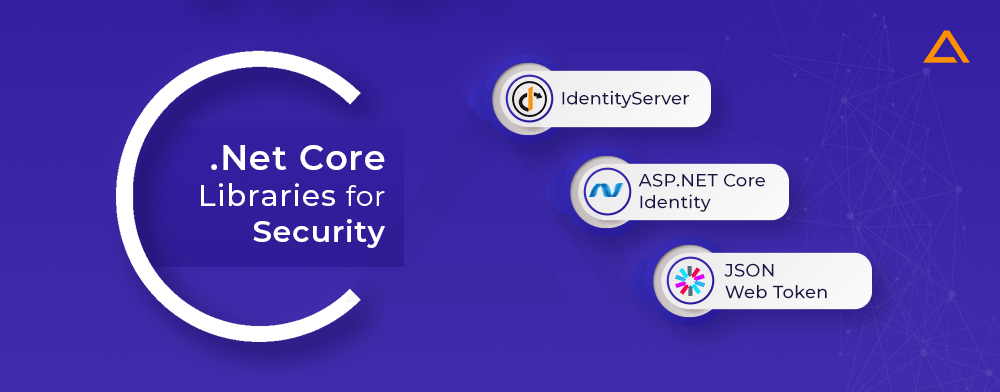
IdentityServer – OpenID Connect & OAuth 2.0 Framework
GitHub Star: 9.1K | Fork: 3.9K| License: Apache-2.0 license
IdentityServer is an open-source framework for implementing modern authentication and authorization using protocols like OpenID Connect and OAuth 2.0 in .NET applications. It can act as an identity provider and token service, supports user registration and login, integration with ASP.NET Core Identity for user storage, access token issuance and Validation, single sign-on across applications, flexible deployment options, and extensibility mechanisms via plugins for stores, tokens, providers etc. It is commonly used to handle user management and secure access control in microservices architectures.
Key Features of IdentityServer
- Open-source identity and access management framework
- Supports OAuth 2.0 and OpenID Connect
- Centralized authentication and authorization
- Single sign-on (SSO) capabilities
- Customizable user stores
- Token issuance and Validation
- Integration with ASP.NET Core and other platforms
- Enables secure identity and API access management.
ASP.NET Core Identity – Membership System For User Management
GitHub Star: 229 | Fork:151| License: MIT License
ASP.NET Core Identity is a membership system that adds user login functionality and user management to ASP.NET Core applications. It provides APIs for managing user accounts, roles, credentials and profile data, account confirmation via email, password reset workflow, account lockout on invalid logins, two-factor authentication for enhanced Security, and pluggable persistence via EF Core or other data stores. It integrates seamlessly with ASP.NET Core’s authentication middleware to support cookie-based login as well as token-based authentication for SPAs.
Key Features of ASP.NET Core Identity
- Identity management system for ASP.NET Core applications
- Handles user authentication and authorization
- Provides user stores for identity data
- Supports multi-factor authentication
- Role-based access control
- Integration with external authentication providers (e.g., Google, Facebook)
- Customizable user profile and claims
- Cookie-based authentication
- Simplifies user management and Security in ASP.NET Core apps.
JWT – Jwt.NET – JSON Web Token Library
GitHub Star: 2K | Fork:454| License: MIT License
Jwt.Net library provides APIs for using JSON Web Tokens (JWT) in .NET applications. It enables generating, validating, serializing and deserializing JWT tokens as well as controlling token content and signing via public/private key pairs or symmetric secrets. Additional capabilities include time-based token expiry, custom JSON serialization, compression, token revocation, and integrating JWT authentication in ASP.NET Core. The library provides full lifecycle handling of JWTs to represent claims securely between parties for common scenarios like API access authorization.
Key Features of JWT
- JWT Encoding/Decoding
- Algorithm Support
- Token Payload Manipulation
- Expiration and Refresh Tokens
- Token Revocation
- Token Validation
- Key Management
- Token Serialization
- Token Verification Middleware
.NET Core Libraries For Testing
.NET has a comprehensive ecosystem of open source libraries for unit testing, integration testing, mocking, test doubles, browser automation, and other testing needs. Popular options include xUnit, NUnit, MSTest, Moq, FakeItEasy, Selenium, SpecFlow, and more. These libraries enable automated testing of .NET applications for quality and reliability.
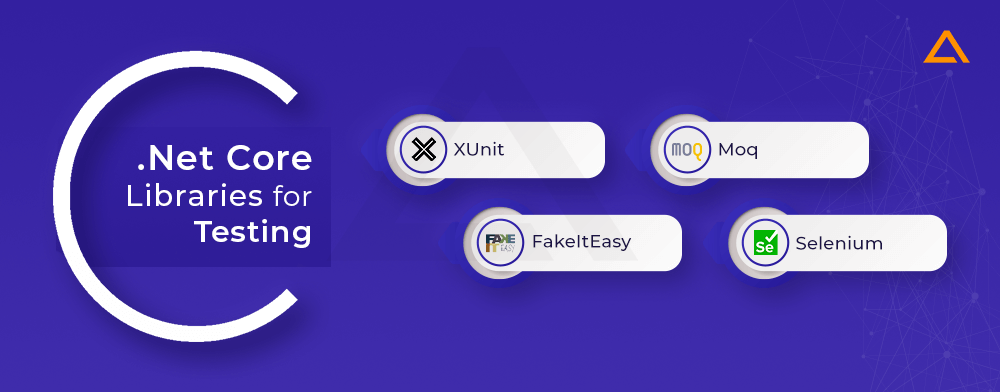
xUnit – Testing Framework to Write Unit and Integration Tests
GitHub Star: 3.8K | Fork:757| License: Apache-2.0 license
xUnit is a widely used open-source unit testing framework for .NET It has a fluid assertive syntax and capabilities like Fact and Theory attributes to define test cases, setup/teardown methods, collection assertions, exception assertions, parallel test execution, customizable assertions, and organization of tests into classes and assemblies. xUnit integrates with all .NET runtimes including .NET Framework, .NET Core, and Mono. It is highly extensible to customize every part of the testing pipeline.
Key Features of xUnit
- Supports unit testing
- Test discovery and execution
- Attribute-based testing
- Extensible and customizable
- Parallel test execution
- Integrated with various IDEs and build systems
- Fixture support
- Data-driven testing
- Assertions and test runners
Moq – Mocking Library For Mocks and Stubs
GitHub Star: 5.4K | Fork:787| License: BSD 3-Clause License
Moq is a popular mocking library for .NET that allows developers to create mock objects for unit testing in order to isolate system under test from its dependencies. With Moq, you can setup mock behavior expectations, verify interactions after test run, parameterize mocks, specify callbacks for members, raise custom events, recursive mocking, configure real implementations, and more. The declarative syntax makes mocks easy to read and maintain. Moq works with interfaces, classes, and static/private members.
Key Features of Moq
- Mocking framework
- Simplifies unit testing
- Create and configure mock objects
- Behavior verification
- Fluent and expressive syntax
- Integration with testing frameworks
- Arrange-Act-Assert (AAA) pattern
- Supports both strict and loose mocks
- Verify method calls and interactions
- Exception handling in mocks
FakeItEasy – Mocking Framework For Faking Dependencies
GitHub Star: 1.5K | Fork:181| License: MIT License
FakeItEasy is a .NET mocking library that makes it easy to fake dependencies for fast and reliable unit tests. Its expressive syntax models real-world behavior of dependencies. Features include strict or loose mocks, automatic fake generation, configurable proxy behavior,PROPERTY and METHOD syntax, recursive fakes, unmatchable loose stubs, fake callbacks, configurable assertions, integrations with test runners, and more. FakeItEasy creates fakes instead of mocks avoiding the need to setup every member.
Key Features of FakeItEasy
- Mocking framework
- Facilitates unit testing
- Create and configure mock objects
- Fluent and expressive syntax
- Arrange-Act-Assert (AAA) pattern
- Supports both strict and loose mocks
- Verify method calls and interactions
- Exception handling in mocks
- Integration with testing frameworks
- Minimal setup and usage friction
Selenium – UI Testing Automation Library
GitHub Star: 27.9K | Fork:7.8K| License: Apache-2.0 license
Selenium is a well-known open-source automated testing platform for web applications. It enables testers to simulate user behaviors including clicking buttons, filling out forms, and browsing across online sites by automating browser interactions. Selenium offers versatility for test script writing by supporting several programming languages. It is well regarded for its capacity to test web applications across several browsers, making it a potent tool for guaranteeing cross-browser compatibility. The software development industry frequently uses Selenium for web application testing since it also supports parallel test execution, takes screenshots, and connects with testing tools.
Key Features of Selenium
- Automated testing framework
- Web application testing
- Cross-browser compatibility
- Supports multiple programming languages
- Interaction with web elements
- Simulates user interactions
- Testing of dynamic web content
- Parallel test execution
- Integration with various testing tools
- Capture screenshots and videos
- Extensive community support
.NET Core Libraries For Resilience Policies
In .NET, a resilience policy is a strategy employed to enhance application reliability in the face of faults and failures. It includes mechanisms such as retrying failed operations, circuit-breaking to prevent system overload, and setting timeouts for responses. Resilience policies are crucial for building robust and fault-tolerant applications, particularly in distributed systems, where network issues or service unavailability can occur.
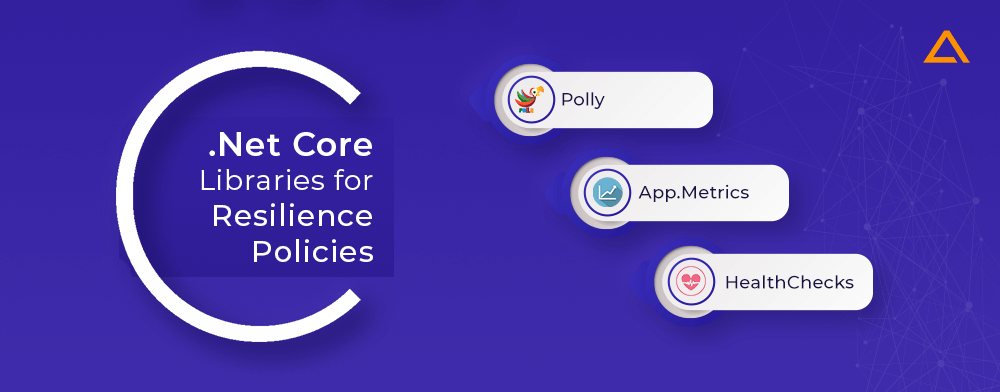
They help ensure consistent and reliable application behavior under adverse conditions.
Polly – Fault Handling Policies Like Retry, CircuitBreaker etc.
GitHub Star: 12.3K | Fork:1.1K| License: BSD-3-Clause license
Polly stands out as a renowned .NET library dedicated to fortifying applications with resilience and fault-tolerance mechanisms. This versatile toolkit furnishes developers with an array of policies, including retry, circuit-breaker, and timeout, streamlining the process of gracefully handling transient issues and mishaps in distributed systems. Polly offers an elegant solution for managing these scenarios, ultimately elevating the dependability of software systems. By defining these policies, developers can craft applications that autonomously manage exceptions, retries, and circuit state transitions, ensuring uninterrupted user experiences in the face of challenges.
Key Features of Polly
- Resilience library
- Retry policies
- Circuit-breaker policies
- Timeout policies
- Bulkhead isolation
- Policy composition
- Exception handling
- Custom policies
- Asynchronous support
- Policy execution contexts
- Fluent API
- Advanced configuration options
- .NET framework compatibility
App.Metrics – In-Process Monitoring For Web Apps
GitHub Star: 2.2K | Fork:286| License: Apache-2.0 license
App.Metrics is an open-source instrumentation library that allows you to monitor and measure performance of your .NET applications. It tracks quantitative data like HTTP request metrics, counters, gauges, histograms etc. that provide insights into app health, throughput, dependencies, and errors. Key capabilities include automatic metering of web apps, publishing metrics via endpoints or logs, configuration of metrics, dashboard, and integrations with Grafana for analytics and monitoring.
Key Features of App.Metrics
- Metrics library
- Measures application performance
- Captures various metrics
- Real-time data visualization
- Custom metric creation
- Extensible and pluggable
- Integration with various platforms
- Supports multiple languages
- Advanced metric aggregation
- Performance optimization
- Monitoring and alerting capabilities
- Comprehensive documentation
HealthChecks – Framework For Reporting Health Of Web Apps
GitHub Star: 6.6K | Fork:729| License: BSD-3-Clause license
HealthChecks.NET is a versatile library that allows developers to monitor the health of their .NET applications and services. It offers a wide range of built-in checks for various components like databases, external services, and custom checks, ensuring that your applications are running smoothly. With its flexibility and ease of integration, HealthChecks.NET is a valuable tool for maintaining the reliability of your web services and applications.
Key Features of HealthCheck
- Healthcheck framework
- Monitors system and app health
- Customizable checks
- Extensible for various services
- Load balancer integration
- Status endpoints
- Real-time monitoring
- Failure alerts
- Protocol support
- Proactive issue detection
- Enhances system reliability
.NET Core Libraries For Mapping
.NET Core offers a plethora of libraries for mapping, simplifying the transformation of data between different structures. These ASP NET Core libraries provide essential tools and techniques for developers to efficiently convert, project, and manipulate data, enabling seamless integration and interaction within diverse application scenarios.
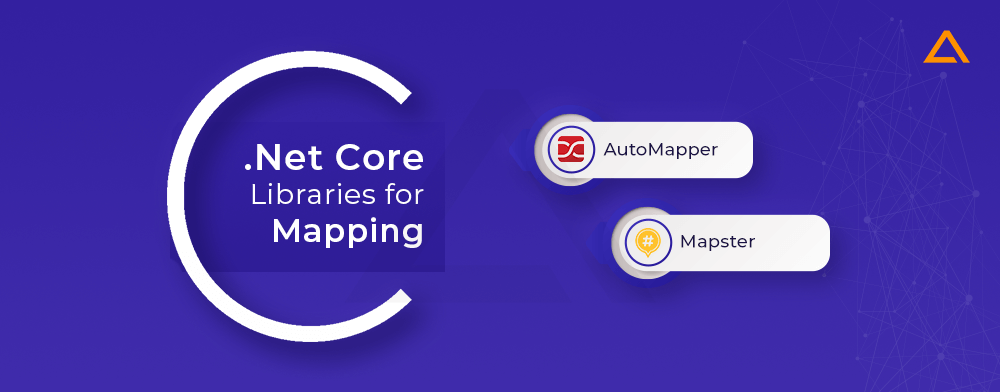
AutoMapper – Object-Object Mapping Library
GitHub Star: 9.5K | Fork:1.7K| License: MIT License
AutoMapper is a popular object-to-object mapping library for .NET that maps between model types based on convention. It eliminates repetitive projection code when converting between view models, DTOs, and domain models. Key features include flattening, mapping inheritance, collections, custom type converters, expression mapping, and configuration validation. AutoMapper simplifies projections and transfer of data between layer boundaries in enterprise applications.
Key Features of AutoMapper
- Simplified mapping
- Convention-based configuration
- Customizable mappings
- Flattening and unflattening
- Queryable extensions
- Async mapping
- Support for nested objects
- Expression-based mapping
- Reverse mapping
- Conditional mapping
- Global configuration
Mapster – Type-Safe Mapping Tool
GitHub Star: 3.9K | Fork: 297| License: MIT license
Mapster is a fast object mapper for .NET that performs type-safe mapping between model types at compile time using generics and lambdas expression. This avoids runtime reflection and mapping configuration. Features include nested mappings, pre/post mapping actions, ignoring unmapped properties, adapters for custom logic, and mapping to different types. Mapster focuses on speed, type safety, and usability for model translations in business applications.
Key Features of Mapster
- Simplified mapping
- Fluent and expressive API
- Convention-based configuration
- Supports custom mappings
- Handles nested objects
- Immutable mapping
- Async and batch mapping
- Efficient performance
- Supports popular .NET platforms
- Active community support
.NET Core Libraries For Validation
For validating data models in .NET, widely used options are Fluent Validation for declarative validation rules, DataAnnotationsValidator for attributes-based Validation, Validator for enterprise validation from patterns and rules, and Chain of Responsibility validation for piping validators.
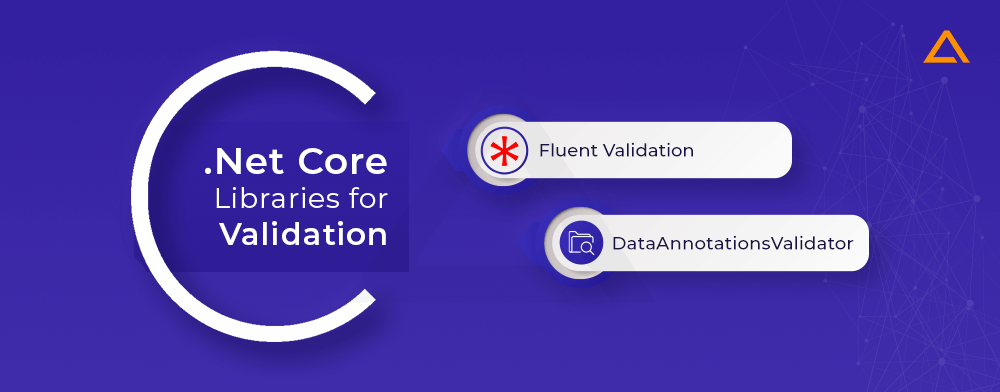
These .NET Core Libraries simplify input validation in web and business apps.
Fluent Validation – Declarative Validation Rules
GitHub Star: 8.4K | Fork: 1.2K| License: Apache-2.0 license
Fluent Validation provides a fluent interface for building strongly-typed validation rules for .NET models. It allows validating objects using reusable validators with conditional logic, parameterized rules, custom error messages, and support for child collections and complex types. Fluent Validation simplifies validation code by avoiding attributes scattered across model classes. Integrations are available for ASP.NET Core, Xamarin, and other frameworks.
Key Features of Fluent Validation
- Fluent validation library
- Rule-based Validation
- Custom validators
- Conditional Validation
- Cross-property Validation
- Internationalization support
- Reusable validation rules
- Fluent API for defining rules
- Error messages customization
- Comprehensive documentation
DataAnnotationsValidator – MVC Integration For DataAnnotation Rules
DataAnnotationsValidator enables client-side and server-side Validation using DataAnnotation attributes in ASP.NET Core MVC. It provides MVC integration for validation attributes like Required, StringLength, Regex, and custom validators. Features include localized error messages, conditional Validation, validating entire object graph, validating child properties, and easy AJAX integration. Overall, it provides a simple way to get Validation in MVC using declarative attributes.
Features of Data Annotation Validator
- Attribute-based Validation
- Declarative validation rules
- Common validation attributes
- Simplified validation setup
- Integration with model classes
- Client and server-side Validation
- Error message customization
- Lightweight validation solution
- Part of .NET framework
- Limited complex validation support
These were some of the best NET Core Libraries divided in to the categories for better understanding. These .NET Core Libraries empower developers with essential tools & solutions, enhancing productivity and enabling the creation of robust, efficient, and feature rich applications in the ever-evolving software landscape
Which Libraries & Tools are Commonly Favoured by Developers in the .NET Core Ecosystem?
Among the preferred tools in the .NET Core development ecosystem, developers commonly rely on ASP.NET Core Libraries & tools for robust web application development, and Entity Framework Core for efficient data access using object-relational mapping.
Additionally, there are ASP NET Core Libraries like AutoMapper, xUnit, FluentValidation, and Polly, which assist in tasks such as data mapping, testing, Validation, and handling resilience in applications. For logging, structured logs, background job processing, and task management, Serilog, NLog, and Hangfire are commonly used. Lastly, Dapper is a valuable resource for optimizing data access with its focus on flexibility and performance.
These .NET Core Libraries collectively expedite development processes for web applications, services, data handling, testing, logging, and job management, and their widespread adoption is attributed to their reliability, capabilities, and active maintenance by the .NET development community.
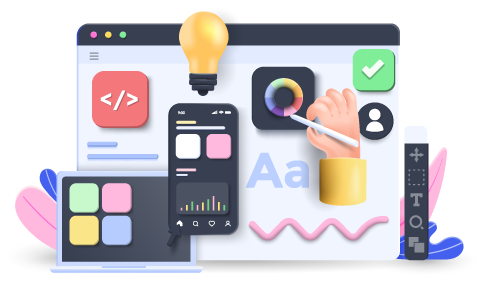
Cutting Costs but
NOT Cutting Quality
that’s how we roll! 🚀
Wrapping Up!
In Summary, .NET Core provides a wide range of helpful Popular NET Core Libraries for developers. These .NET Core Libraries cover various aspects of software development, like building websites, working with data, testing, and more. They’re popular because they work well and have strong support from the developer community. Staying updated with these .NET Core Library is crucial for successful software development in the world of .NET Core development.
FAQs
The main difference lies in their purpose. .NET Standard is a specification that represents a set of APIs that all .NET implementations must provide. It establishes greater uniformity across .NET implementations. The .NET Core framework is an implementation of .NET that adheres to the .NET Standard specification. So .NET Standard is the interface while .NET Core contains the actual library and runtime implementation.
No, .NET Core and ASP.NET Core are related but distinct. .NET Core is the cross-platform implementation of .NET that runs on Windows, Linux and macOS. ASP.NET Core is a web framework built on top of .NET Core, allowing you to build web apps that run cross-platform. So ASP.NET Core consumes .NET Core to provide web development services.
Yes, Microsoft adopted an open-source model starting with .NET Core 1.0 in 2016. Major .NET libraries and frameworks like .NET Core, ASP.NET Core, Entity Framework Core, and ML.NET are now open source on GitHub under MIT licenses. Developers can view code, log issues, submit pull requests, and contribute to .NET like any other open-source project.
There is no single "best" .NET Core library. The optimal library depends on the specific app requirements and use cases. But these are some of the most versatile .NET Core libraries used in many applications.
✦ ASP.NET Core - For web development
✦ Entity Framework Core - For data access
✦ SignalR - For real-time web functionality
✦ ML.NET - For machine learning
✦ JSON.NET - For JSON serialization
✦ Polly - For resilience patterns like retry, circuit breakers
✦ Hangfire - For background processing
✦ FluentValidation - For validating .NET objects
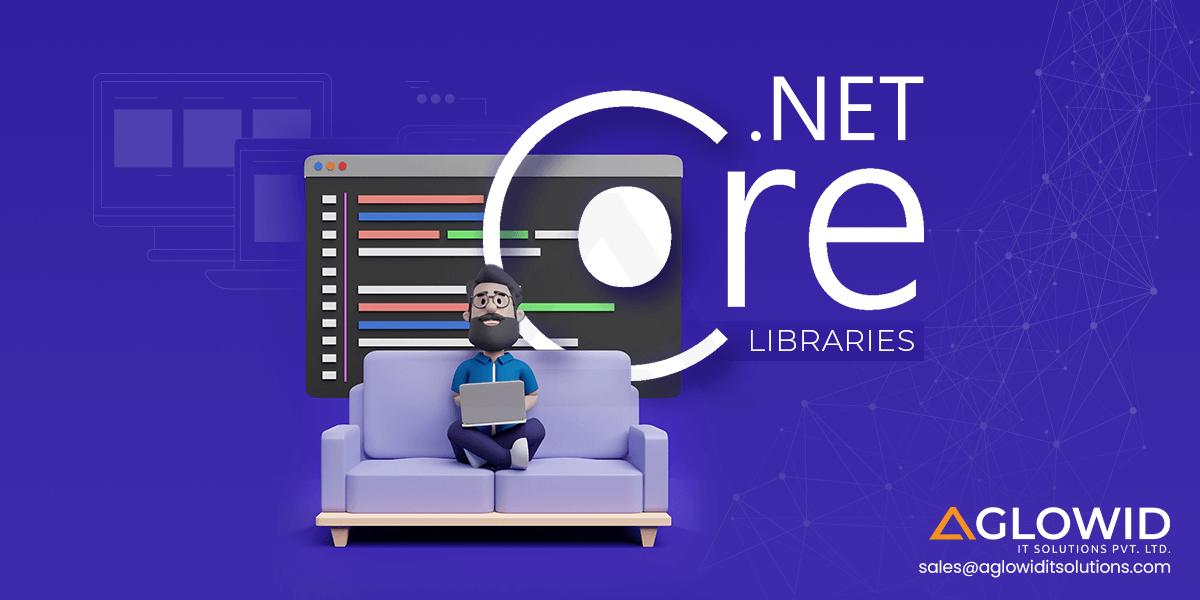

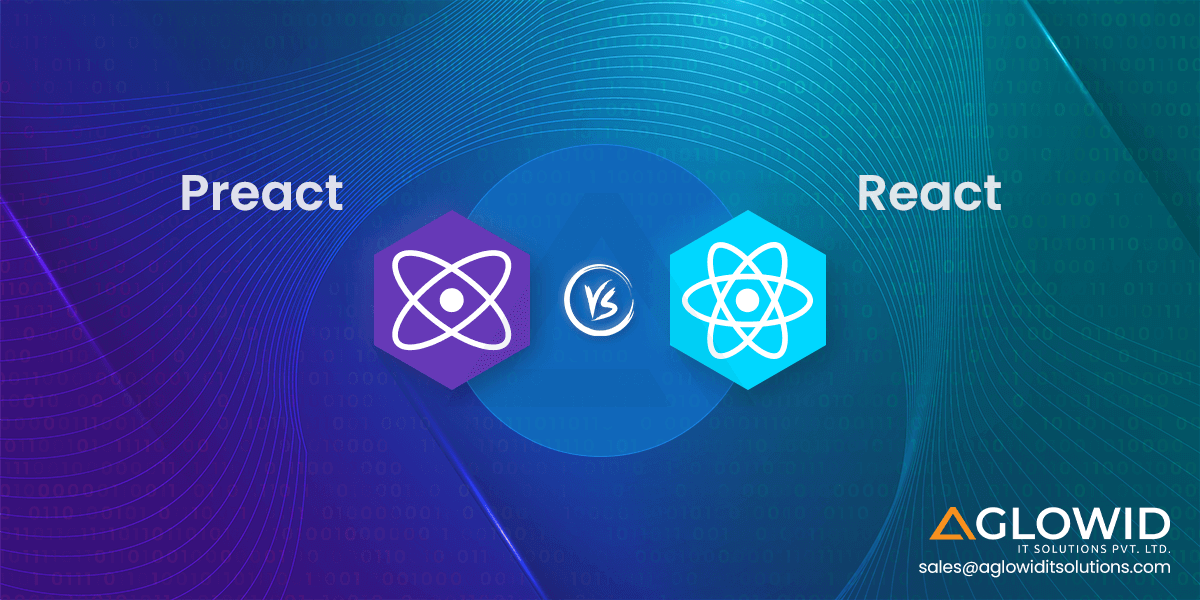


 Say
Say